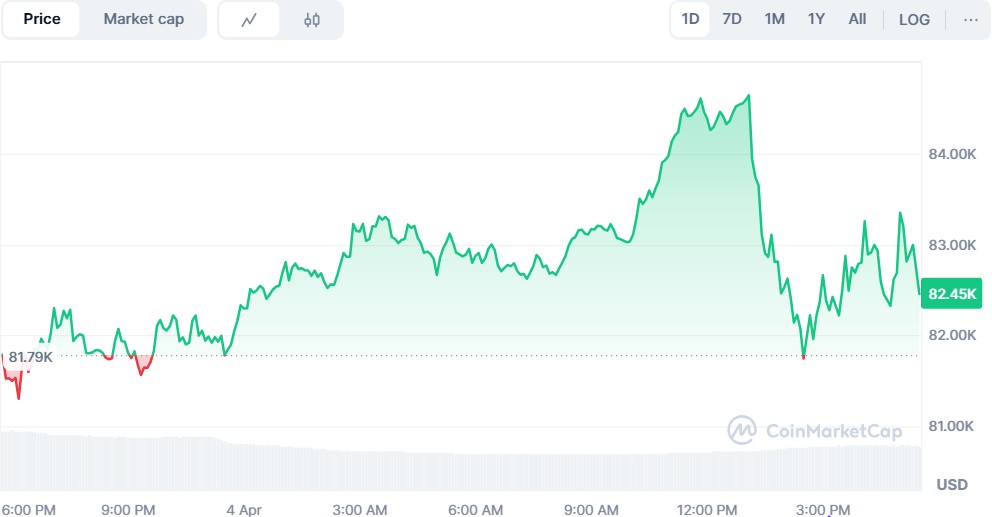Why is Bitcoin Going Down? China’s 34% Tariff Deepens Market Decline
Global markets took a sharp hit today (Friday) after China announced a 34% tariff on all U.S. goods, escalating tensions in the ongoing trade war.
The move sent shockwaves through the global stock markets and cryptocurrencies alike, with Bitcoin retreating from its early gains to trade at $82,000 at the time of this publication. Investors are now bracing for further volatility as fears of a prolonged economic standoff intensified.
Bitcoin and Stocks Take a Hit
China’s retaliatory tariffs, which came in response to President Donald Trump’s decision to increase levies on Chinese imports to 54%, spurred risk-off sentiment across global markets.
Bitcoin initially climbed to $84K before reversing course, dropping 3% to $81K in the daily chart. Other cryptocurrencies, including Ethereum (ETH), Solana (SOL), and Dogecoin (DOGE), also erased their early gains, according to CoinMaketCap data.

Equity markets saw a similar reaction. S&P 500 and Nasdaq tumbled more than 2% and 3%, respectively, following the announcement, signaling another rough session for Wall Street. Investors rushed to reassess the economic fallout from the escalating trade war.
China’s Counteroffensive in the Trade War
The Chinese government’s tariff hike represents one of its strongest responses yet in the prolonged trade dispute. In addition to the 34% tariffs, Beijing imposed new export controls on certain rare earth materials, Reuters reported.
It also lodged a formal complaint with the World Trade Organization (WTO) and added 11 entities to its "unreliable entity" list, effectively barring them from certain business operations in China.
Friday’s market rout extended beyond the U.S. to other major economies. In Japan, Prime Minister Shigeru Ishiba called the tariff war a "national crisis" as Tokyo’s stock market neared its worst weekly performance in years.
LIBERATION DAY RECIPROCAL TARIFFS 🇺🇸 pic.twitter.com/ODckbUWKvO
— The White House (@WhiteHouse) April 2, 2025
European equities also posted significant losses, with investors watching closely for the European Union’s next steps. Firms such as Adidas, Puma, and Pandora have seen their stock prices tumble as the tariffs target Southeast Asia, where many of these companies manufacture their goods.
What’s Next?
With China’s countermeasures now in place, all eyes are on the next move from the U.S. and its allies. The European Union has yet to take a unified stance, with officials debating whether to activate its 'Anti-Coercion Instrument,' a policy designed to counter economic pressure from third countries.
EU ready to retaliate against Trump’s tariffs, says von der Leyen https://t.co/lmKbwj51NQ
— Financial Times (@FT) April 3, 2025
For now, markets remain on edge, and traders are preparing for further turbulence. Whether a resolution is near or if the trade war will continue to spiral remains a pressing question for investors worldwide.



